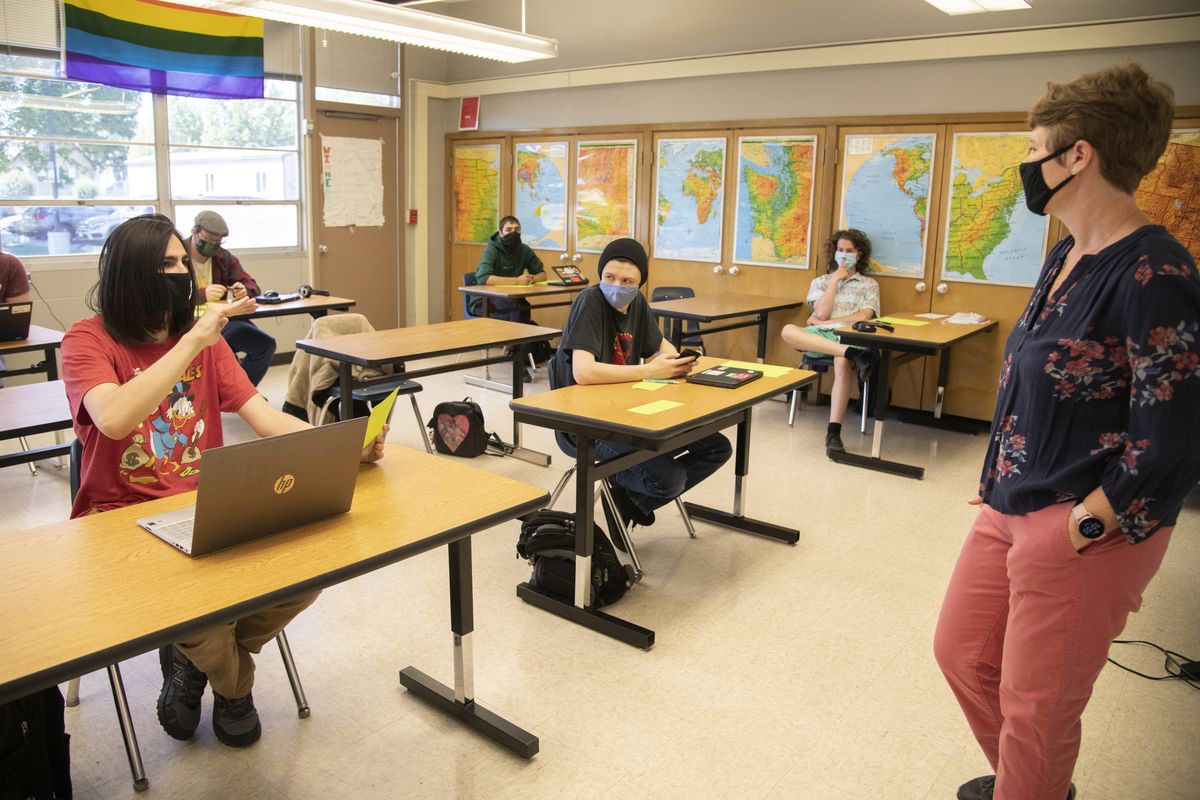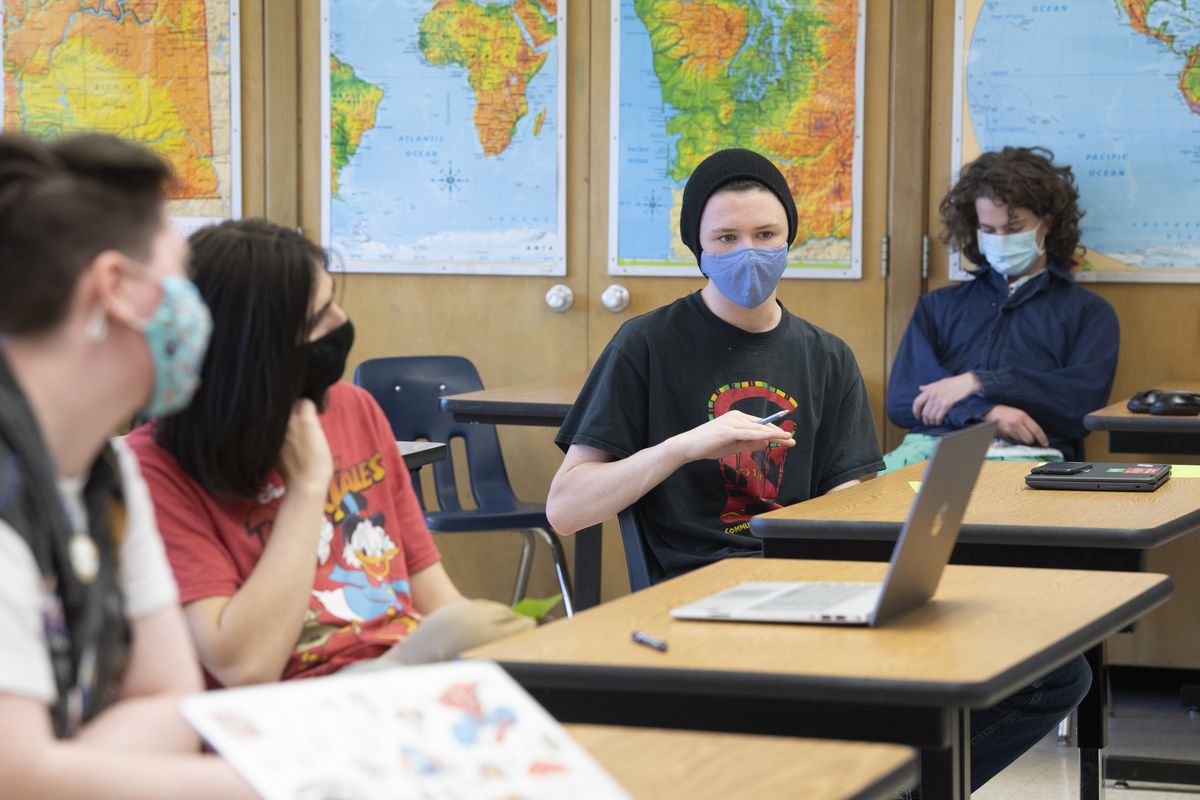My favorite mistake: Community School students create podcasts from interviews with senior volunteers

One podcast tells the story of a mom setting up a blind date for her son, an awkward mistake, or so she thought based on his reaction. However, her leap eventually led to that date, then marriage and three grandchildren.
The discovery of life stories from strangers took time in building relationships, said Sawyer Burchett, a high school senior at the Community School. Burchett and three other students created the podcast after multiple virtual meetings with adult senior volunteers.
“Before we did the interviews, we talked to them for a couple of hours to get to know them, and we did fun games like what would you bring to a deserted island?” Burchett said.
“It’s important to build a relationship, so by the time they told the stories, I knew about her life. It was easier to ask questions, easier for her to talk, so it’s important to have a rapport.”
This past quarter, 30 junior and senior students at the Spokane school broke into small groups and spent several weeks recording the virtual visits with one or two of the older adults they were matched with through a pilot project called Writing Across Generations.
Meanwhile, everyone wrote reflections in journals and looked for stories they could turn into compelling podcasts around a common theme, which eventually grew into “My Favorite Mistake” with podcasts now available online.
Once they identified a story, the students began editing raw audio down into something with a conflict, rising action, climax and resolution. They added narration, sound effects and music that was in some cases written by the students. On Wednesday, the class listened to nearly complete renditions of the students’ projects and offered feedback about writing, editing and audio quality.
Writing Across Generations was led by the Retired and Senior Volunteer Program of Spokane County, in cooperation with Community School, a Spokane Public Schools project-based learning site that matches students with multiple community groups. The students and their teachers hope the podcast series will air in upcoming weeks on Spokane Public Radio.

Denise Giblin, 71, lives in Spokane and met virtually with Burchett’s student group along with another senior, RSVP volunteer John Spencer.
“I have always worked with older adults because my master’s degree was in gerontology,” Giblin said. “I thought when I signed up for this project that I wanted to reach out to a different generation, and this ended up being a really delightful experience because as I looked at the tapes after the sessions, I noticed how many times I laughed.”
“The students kind of brought out a new way of looking at things.”
It was her story that became “Blind Date,” after she’d talked about a chance encounter years ago when she met a young woman who had a beautiful smile, then got up the courage to ask if she’d consider a date with her son. At the time, he’d just returned home from the military, and it was after his twin sister had died.
“I felt bad because he was having a hard time getting his feet under him in the world of social connections. He was kind of lonely,” Giblin said. Then she laughed. “I thought it would help him when I told him I’d set up this blind date, and he said, ‘Oh, Mom, why’d you do that?’ So, I said, ‘She doesn’t know who you are, you don’t have to call.’ He didn’t say anymore, so I figured he’d let it go.”
But, he later told her that he’d actually called, they’d dated, and he liked her and her beautiful smile. “I noticed her, too, because of her beautiful smile,” Giblin added. “She had this winning smile and still does to this day.”
The team of students she got to know also were very appreciative of time spent with RSVP volunteers, which surprised her. “Actually, they got into it, too, and they really enjoyed the story I told.”
Both the students and RSVP volunteers were encouraged to journal after each virtual session. At first, the sessions lasted about two hours once a week, and then about an hour weekly.
“There’s been a lot of writing and journaling; that’s how it started out,” Community School teacher Nate Seaburg said. “Then as we were talking about 21st century technology, it morphed into something that’s more engaging I think for the students and representative of how stories are told today.”
“They’re still doing some writing, so it’s a collaboration of everyone in kind of mining for the same questions that will make 10 podcasts in one season, and that question this go-around is my favorite mistake.”
Seaburg would like to collaborate again on the RSVP project in the future. “At the end of the day, the centerpiece of this is this connection between students and our community partners.”
The students were in school two days a week, so their virtual meetings with seniors happened while home. Their attendance for all sessions was 100%, Seaburg said. He is a team teacher for the group with Bobbi Konshuk, who worked Tuesday with about 15 of the students as they listened to podcasts to refine them before Friday’s deadline to be completed.
Each group had three overlapping learning goals, to apply technical, conversational and storytelling skills.
Seaburg said he’d noticed near the end of the project that if students already were advanced in one, such as technical knowledge, they still grew in the other two skill sets.
About three to four students collaborated per podcast.
For a podcast titled “Overlander,” a RSVP senior shared about a trip to Africa with her husband. Their vehicle got stuck in a tar pit. They had made the mistake of a wrong turn and accelerating to sink the vehicle deeper, but the couple learned to rely on the community around them to get out.
Ashton Arnold, a Community School senior who supported that podcast, said the experience taught him about creating a high-quality podcast while working more as a leader with other students rather than taking over the bulk of a project.
But Arnold said an overall lesson for him was learning that you can always make a connection with someone despite differences such as ages or politics. And the meetings were fun as everyone became more comfortable sharing.
“It was nice to be able to talk to someone and be open with someone else who’s different and the same, and to talk to somebody who has far more experience in life than me,” Arnold said. “Because right now, this is my life for the next two weeks, and so the things that happen now feel huge even when they might not be nearly as big as they feel.”
“For me, making plans for the future right now, it was interesting just talking to somebody who can say, ‘Don’t worry too much about your plans for the future,’ go with the flow, because for the most part, these are loose plans, and 90% of them are going to get demolished by the fact that life happens.”